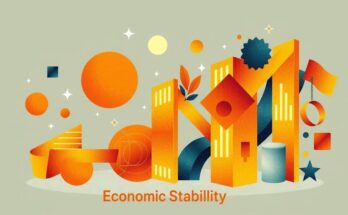In Argentina, distrust in banks continues as many citizens, especially the elderly, hoard U.S. dollars at home in response to ongoing economic instability. President Javier Milei’s government launched a plan to encourage the banking of these so-called ‘mattress dollars,’ allowing deposits without source declaration in a bid to stabilize the economy. However, skepticism remains high, with concerns over illicit funds and a lack of trust in government policies persisting among citizens.
In Argentina, a vast number of citizens, notably the elderly, hoard U.S. dollars in unconventional places, illustrating a deep-rooted distrust in the banking system. For 84-year-old Rita Lopez, her savings are safe in a simple pea can in her kitchen. Lopez’s reluctance to engage with banks dates back to childhood, influenced by the country’s tumultuous economic history, which has seen endless crises. “I wouldn’t even think of putting my savings in the bank,” she stated, emphasizing her fears of theft.
The Argentine government estimates that roughly US$200 billion, known as “mattress dollars,” exists outside the banking system—this amount is reportedly five times the reserves of the central bank. In a bid to integrate these funds into the economy, President Javier Milei’s administration has launched an initiative allowing deposits of up to 100 million pesos (about US$88,300) without needing to declare the source of the funds. By encouraging citizens to bank their dollars, the government hopes to boost foreign reserves and stimulate economic growth.
Despite the government’s efforts, skepticism remains high among the populace, especially for individuals like Lopez who recall the 2001 economic collapse. This previous crisis led to the infamous “corralito,” a measure that froze bank accounts and limited withdrawals, infamously resulting in riots and loss of life. “The one who kept his savings [in the bank] was my father, he always lost,” Lopez recalled, illustrating the generational trauma surrounding banking.
President Milei, an outspoken anarcho-capitalist, is determined to stabilize the economy, claiming he is unconcerned about the origins of the dollars entering the system. “I don’t care in the slightest where the dollars come from,” he said. However, experts warn that without stringent reporting requirements, this could inadvertently open doors for illicit activities like money laundering.
Economist Pablo Tigani criticized the initiative, explaining that failing to track the origin of funds could allow proceeds from various illegal activities into the formal economy. He further elaborated, “It amounts to an amnesty for those who did not pay taxes, without distinction between tax evasion or even money laundering.” In defense, Presidential Spokesman Manuel Adorni stated that those with undeclared funds are mostly regular citizens who have suffered from excessive taxation policies.
For Lopez, however, her fears outweigh the potential benefits of economic recovery through banking initiatives. She firmly believes that the government cannot be trusted based on their previous actions. “One day the government tells you one thing and then another government comes in and does something else. I don’t trust them. I wouldn’t put my money in the bank,” she asserted, highlighting the ongoing distrust among Argentines toward their banking institutions and the government’s economic policies.
This distrust, born from long-standing hardships, showcases the challenge faced by President Milei as he seeks to navigate the complexities of restoring the nation’s financial stability. The effort to bring mattress dollars into play reflects broader attempts to revitalize an economy still grappling with the fallout of its erratic financial history.
In summary, many Argentines, particularly the older generations, are hesitant to deposit their savings into banks, which has led to a massive sum of dollars being stored at home—sometimes in unusual places like cans. Amidst economic uncertainty and previous banking crises, the government’s recent efforts to motivate citizens to bank their dollars may face significant resistance due to lingering mistrust. This underscores the formidable task ahead for President Milei, who must convince a skeptical public that their savings are safer in banks than under their mattresses. The intersection of trust, economic recovery, and historical trauma is pivotal in shaping Argentina’s financial future.
Original Source: www.taipeitimes.com




